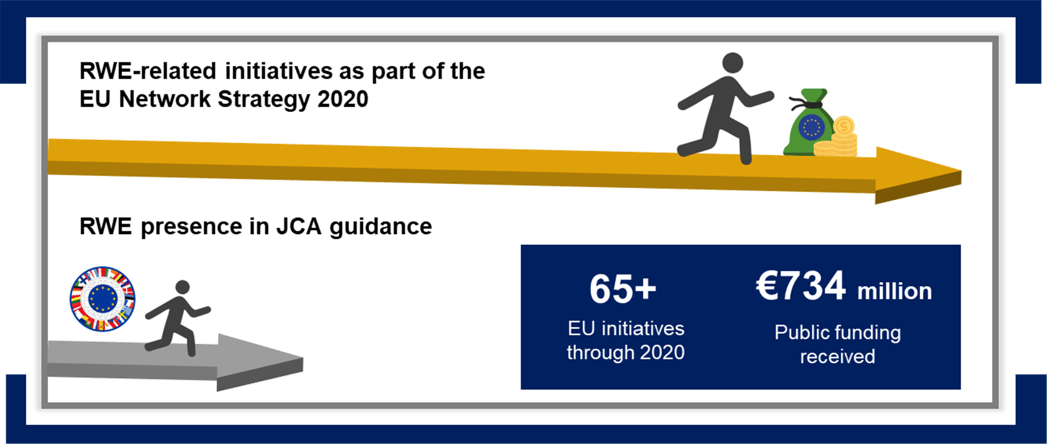Real-Life Data-Sharing and EU Joint Clinical Assessments: Is Closing this Chasm a Mission Impossible?

Written by Grammati Sarri, David Smalbrugge, Andreas Freitag, and Evie Merinopoulou
The vision of a single, centralized system for the comparative joint clinical assessments (JCA) of health technologies in the European Union (EU) is now a reality, with corresponding guidance that supports EU member state cooperation and increases transparency in clinical assessments. However, oversight by the European Network for Health Technology Assessment (EUnetHTA) 21 will cease in September 2023, leaving stakeholders (pharmaceutical companies, local decision-makers) uncertain about next steps for the EU JCA guidance, particularly regarding the use and weight of real-world evidence (RWE) and its opportunities in decision-making. [1]
Lack of recognition of RWE methodologies to address some of its inherent limitations seems like little return on investment given the money allocated to fund EU initiatives that include RWE as a key component to improve patient healthcare and data-sharing among member states. For example, the EU Network Strategy 2020, the coalition formed as part of the European Health Data & Evidence Network (EHDEN) project, and several related initiatives received more than 734 million Euros of public funding[2] through 2020 to subsidize 65 initiatives2 (Figure 1); yet these initiatives fell well short of supporting the overarching mission if not fully utilized in EU HTA decision-making.
Figure 1: Discrepancy between EU investment in data-sharing projects and their integration as part of JCA guidance topics

NICE,[3] CADTH[4], and other non-EU health technology assessment (HTA) bodies have transparently acknowledged the increasing role of RWE in reimbursement decision-making especially in technologies’ comparative effectiveness assessments. Similarly, there is a recent impetus by EMA to expand access to diverse and complementary data sources (DARWIN EU).[5] However, the failure of EU JCAs, so far, to emphasize the full potential of RWE in clinical assessments of health technologies is indefensible. This can either be explained due to EU assessors lack of familiarity and experience with related RWE analytical methodologies or due to the leading role of some EU HTA bodies such as the German G-BA agency in the whole process. For example, G-BA, which was named as the interim coordinator (through 2024) for the parallel scientific advice from EMA and the JCA, holds a well-known position around limited trust in RWE[6] and lags behind other EU HTA agencies (e.g., HAS[7]).
Therefore, key unanswered questions are still hanging:
- Is closing the chasm between RWE acceptance thresholds in JCAs a mission impossible given the local HTA differences in the EU and the lack of implicit JCA RWE guidance?
- Is EU JCA guidance falling too far behind the European Medicines Agency (EMA) push for standardization and encouragement of sharing real-life data across EU member states?
Stakeholders worry that the pathway to a unified EU HTA approach may be a long one.[8] The challenges in building and timely delivery of evidence packages for JCAs have been well documented, and discrepancies in HTA methodology between EU members states and EU JCAs remain a hurdle.[9] However, what is less emphasized is how the current JCA guidance is in danger of missing a critical window of opportunity to capitalize on the regulatory RWE data-sharing frameworks (data sources, common data models, analytical packages) to make the vision of the JCA one for the AGES (Figure 2).
Figure 2: JCA vision one for the AGES

Until more EU JCA guidance regarding real-life data is highlighted, companies can start preparing activities around the following essential components:
- Need for constant Adaptability in terms of evidence requirements and internal capabilities; companies must fundamentally shift from the traditional, two-cycle product preparation to constructing regulatory and local HTA submissions in separate timeframes led by different internal teams with distinctive capabilities.
Action: Any group preparing for EU JCA submissions must be equipped with epidemiological principles and RWE training given the short time interval between different submissions.
- Addressing concerns about the Generalizability of trial data to reflect local standards of care and the need for additional evidence-generation planning. If JCAs are largely focused on findings from trial programs (conducted mainly from a global perspective), EU (local) generalizability will be inherently compromised. Research investment in EU RWE studies through patient participation may fall behind other international markets where clear RWE HTA guidance encourages such investments. Questions also remain regarding the impact of conflicting evidence on reimbursement decisions (e.g., differences in evidence submitted to the JCA and to validate assumptions in cost-effectiveness analyses or other aspects that are only considered at a local level). For example, companies will need to answer questions from (local) HTA bodies if (local) RWE invalidates some of the assumptions (uncertainties) from the clinical trial findings, potentially moving the threshold of decision-making in terms of comparative clinical benefits of new treatments, or if datasets from different EU countries result in conflicting findings.
Action: Companies should carefully consider advanced statistical methods and careful alignment between regulatory, local, and pan-EU perspectives in such situations.
- Constant Effort to generate the most impactful evidence (independent of study design). Generating findings from RWE studies is time-consuming, especially given high evidentiary standards and the complexity of diseases; however, in-house RWE studies conducted as part of EMA assessments, EU patient registries (through EMA’s Patient Registry Initiative), and much-needed JCA RWE guidance can help bridge the gap between efficiency and quality. Incorporating health equity concerns and patient access differences in JCAs will only be realistically implemented using collated RWE EU efforts considering local healthcare system differences. The exclusion of RWE from JCAs could indirectly exclude health equity considerations in the comparative clinical assessments.
Action: Companies must explore opportunities generated by EU common data models, standardization criteria, and EU-funded RWE case studies to maintain a flow of EU healthcare data for use in decision-making. Companies working with patient organizations should lobby for the RWE potential to unravel health inequalities across patient groups and members of the EU.
- Urgency for Speed to meet the short JCA timelines. The limited time between trial read-outs, JCAs submission, and any additional local (HTA) requests will require manufacturers to anticipate the need for multiple analytical scenarios (on top of several PICOs).
Action: Companies should consistently invest in early integrated evidence plans considering complex analytical scenarios, multiple subgroup analyses, and exploratory use of different RWE methodologies (trial emulation, bias quantification methods, threshold analyses) while utilizing automation and artificial intelligence tools in their practices (following direction by EU HTA funded projects[10]) to manage timelines.
Have questions? Contact us!
[1] Of note, RWD reference was made in two documents published in 2022 (the Direct and Indirect Comparisons and the Validity of Clinical Studies) regarding RWD validity issues and use of ROBINS-I tool to assess data quality.
[2] Plueschke K, McGettigan P, Pacurariu A, et al. EU-funded initiatives for real world evidence: descriptive analysis of their characteristics and relevance for regulatory decision-making. BMJ Open 2018;8:e021864. doi: 10.1136/bmjopen-2018-021864
[3] https://www.nice.org.uk/corporate/ecd9/chapter/overview
[4] www.cadth.ca/sites/default/files/RWE/MG0020/MG0020-RWE-Guidance-Report.pdf
[5] https://www.ema.europa.eu/en/documents/report/real-world-evidence-framework-support-eu-regulatory-decision-making-report-experience-gained_.pdf
[6] Replacing RCTs with real world data for regulatory decision making: a self-fulfilling prophecy? BMJ 2023;380:e073100; G-BA, https://www.g-ba.de/presse/pressemitteilungen-meldungen/932/; G-BA, https://www.g-ba.de/presse/pressemitteilungen-meldungen/948/
[7] Vanier A, Fernandez J, Kelley S, et alRapid access to innovative medicinal products while ensuring relevant health technology assessment. Position of the French National Authority for HealthBMJ Evidence-Based Medicine Published Online First: 14 February 2023. doi: 10.1136/bmjebm-2022-112091
[8] McLaren M. The EU joint HTA procedure: a gate or barrier for access? Accessed May 2023, https://www.pharmaceutical-technology.com/sponsored/the-eu-joint-hta-procedure-a-gate-or-barrier-for-access/
[9] Kisser, A., Knieriemen, J., Fasan, A. et al. Towards compatibility of EUnetHTA JCA methodology and German HTA: a systematic comparison and recommendations from an industry perspective. Eur J Health Econ 23, 863–878 (2022). https://doi.org/10.1007/s10198-021-01400-2
[10] Zemplényi A, Tachkov K, Balkanyi L, Németh B, Petykó ZI, Petrova G, Czech M, Dawoud D, Goettsch W, Gutierrez Ibarluzea I, Hren R, Knies S, Lorenzovici L, Maravic Z, Piniazhko O, Savova A, Manova M, Tesar T, Zerovnik S and Kaló Z (2023) Recommendations to overcome barriers to the use of artificial intelligence-driven evidence in health technology assessment. Front. Public Health. 11:1088121. doi: 10.3389/fpubh.2023.1088121
Read more from Perspectives on Enquiry & Evidence:
Sorry no results please clear the filters and try again

Can RWE Help Restore Decades of Health Inequalities? Yes, and Here’s How

Reflections on the RCT DUPLICATE Study and Increasing Confidence in Real-World Evidence



